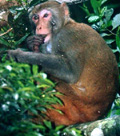Get
To Know
|
 The
Rhesus Macaque is brown or grey in color and has a pink face,
and they are both arboreal and terrestrial. They are quadrupedal
and, when on the ground, they walk digitigrade and plantigrade.
Adult males measure approximately 53 cm tall on average and weigh
about 7.7 kg and they are mostly herbivorous, feeding on mainly
fruit, but also eating seeds, roots, buds, bark, and cereals, as
well as some insects. Rhesus macaques are native to northern India,
Bangladesh, Pakistan, Nepal, Burma, Thailand, Afghanistan, Vietnam,
and southern China. They have the widest geographic ranges of any
nonhuman primate, occupying a great diversity of altitudes; they
may be found in grasslands, woodlands, arid open areas, and in mountainous
regions up to 2,500 m in elevation. They are regular swimmers. Perhaps
because humans and macaques apparently share about 93% of their
DNA sequence and shared a common ancestor roughly 25 million years
ago, Rhesus macaques are noted for their tendency to move from rural
to urban areas, coming to rely on handouts or refuse from humans.
Due to its relatively easy upkeep in captivity, wide availability
and closeness to humans anatomically and physiologically, it has
been used extensively in medical, biological, and psychological
research. Even though, in psychological research, rhesus macaques
have demonstrated a variety of complex cognitive abilities, including
the ability to make same-different judgments, understand simple
rules, monitor their own mental states, and have even been shown
to demonstrate self-agency, an important type of self-awareness,
the rhesus macaque was used in the well-known experiments on maternal
deprivation carried out in the 1950s by controversial comparative
psychologist Harry Harlow. The U.S. Army and NASA launched rhesus
macaques into outer space during the 1950s and 1960s, and the Soviet/Russian
space program launched them into space as recently as 1997. One
of these primates was allowed to return alive. In January, 2001
a Rhesus macaque, the first transgenic primate carried foreign genes
originally from a jellyfish. The
Rhesus Macaque is brown or grey in color and has a pink face,
and they are both arboreal and terrestrial. They are quadrupedal
and, when on the ground, they walk digitigrade and plantigrade.
Adult males measure approximately 53 cm tall on average and weigh
about 7.7 kg and they are mostly herbivorous, feeding on mainly
fruit, but also eating seeds, roots, buds, bark, and cereals, as
well as some insects. Rhesus macaques are native to northern India,
Bangladesh, Pakistan, Nepal, Burma, Thailand, Afghanistan, Vietnam,
and southern China. They have the widest geographic ranges of any
nonhuman primate, occupying a great diversity of altitudes; they
may be found in grasslands, woodlands, arid open areas, and in mountainous
regions up to 2,500 m in elevation. They are regular swimmers. Perhaps
because humans and macaques apparently share about 93% of their
DNA sequence and shared a common ancestor roughly 25 million years
ago, Rhesus macaques are noted for their tendency to move from rural
to urban areas, coming to rely on handouts or refuse from humans.
Due to its relatively easy upkeep in captivity, wide availability
and closeness to humans anatomically and physiologically, it has
been used extensively in medical, biological, and psychological
research. Even though, in psychological research, rhesus macaques
have demonstrated a variety of complex cognitive abilities, including
the ability to make same-different judgments, understand simple
rules, monitor their own mental states, and have even been shown
to demonstrate self-agency, an important type of self-awareness,
the rhesus macaque was used in the well-known experiments on maternal
deprivation carried out in the 1950s by controversial comparative
psychologist Harry Harlow. The U.S. Army and NASA launched rhesus
macaques into outer space during the 1950s and 1960s, and the Soviet/Russian
space program launched them into space as recently as 1997. One
of these primates was allowed to return alive. In January, 2001
a Rhesus macaque, the first transgenic primate carried foreign genes
originally from a jellyfish.
|
|
|
|
Ash Wednesday
By
Donal Mahoney
Ash Wednesday I saw Quinn again,
first time in years, sailing the streets,
weaving through people,
collar up, head cocked,
arms like telephone poles sunk
in the pockets of his overcoat,
the brilliant pennants of his long red hair
waving over the stadium
where years ago he took my handoff,
bucked off guard, found the free field,
and heaved like a bison
into the end zone.
Tonight, when Quinn wove by me muttering,
I should have handed him the ball.
I should have screamed, "Go, Quinn, go!"
He would have stiff-armed the lamppost,
found the free field again,
left all in his wake to gawk
as he hit the end zone
and circled the goal posts,
whooping and laughing,
flinging the ball like a spear
over the cross-bar,
back to Iraq.
|
 The
Rhesus Macaque - Issue Eighteen
The
Rhesus Macaque - Issue Eighteen